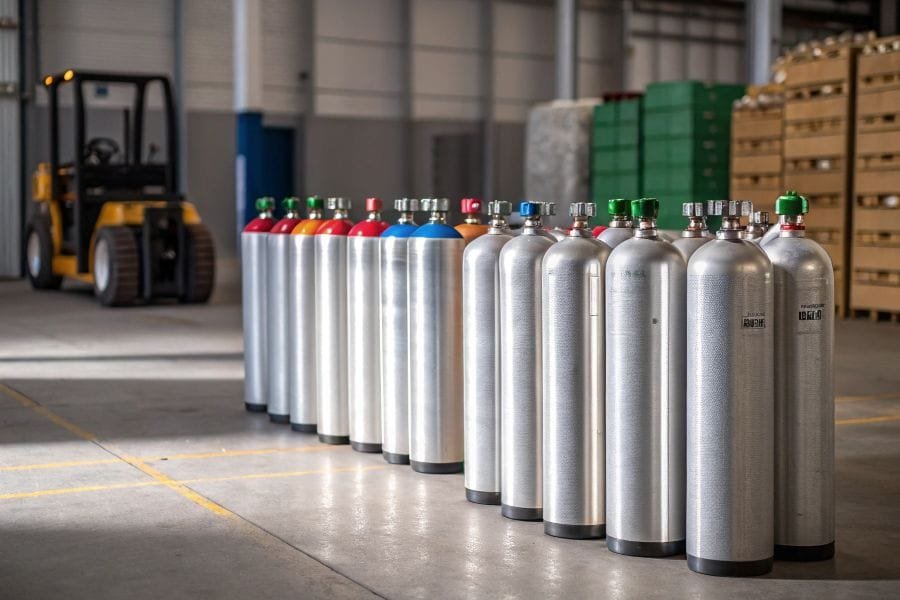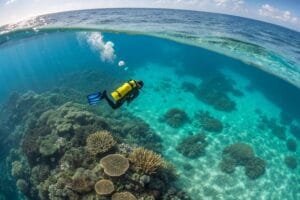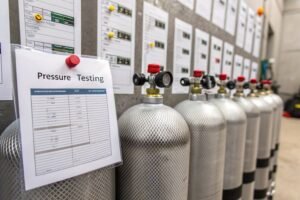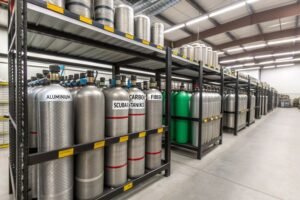Finding a good supplier is stressful. You see ads for cheap scuba tanks, but you worry about the quality and reliability. A bad shipment could destroy your reputation and hurt your customers.
To source wholesale scuba tanks effectively, look beyond the price. Focus on finding a true manufacturing partner. Verify their quality control, material standards, and international certifications. A reliable partner offers long-term value that far outweighs any small, initial savings from a cheaper, riskier supplier.

I've been in the gas cylinder business for a long time. I've talked to hundreds of buyers, from large distributors to owners of local dive shops. They all start with a similar concern about price, but the smart ones quickly learn that price is only a small part of the story. The real goal is to find a partner who helps your business grow, not a supplier who creates problems. This guide is built from those conversations and my own experience on the factory floor. It will walk you through the important questions you need to ask. It will help you find a supplier you can trust for years to come.
Why does focusing only on "cheap" scuba tanks cost your business more in the long run?
You found a supplier with an amazing price, much lower than anyone else. But you have a nagging feeling. What are they not telling you? This could be a huge mistake.
"Cheap" tanks often come with hidden costs. These include poor-quality materials that fail early, inconsistent manufacturing that leads to safety risks, and unreliable shipping that causes major delays. These problems can cost you much more in customer returns, legal issues, and lost business reputation.
The Real Cost of a "Bargain"
When I first started, I spoke with a buyer from the Middle East. Let's call him Ahmed. He runs a successful chain of dive shops and was tempted by a very low price from a new supplier he found online. The price was almost too good to be true. He placed a large order. The problems started right away. The shipment was delayed by two months because the supplier didn't have the right export documents. When the tanks finally arrived, nearly 20% of them had cosmetic defects like poor paint jobs and scratches. Worse, a few tanks failed his company's internal pressure tests. The supplier was slow to respond and refused to cover the return shipping costs. Ahmed told me he lost thousands of dollars, not just on the bad tanks, but on the sales he missed because he didn't have the inventory. The damage to his reputation with his local customers was the biggest cost of all. He learned a hard lesson: the initial price tag is never the full story.
Hidden Costs You Must Consider
- Product Returns: A cheap tank is more likely to have defects. When customers return products, you lose money on the sale, the shipping, and your staff's time.
- Safety Risks: This is the most serious cost. A high-pressure cylinder is a serious piece of equipment. A failure can cause severe injury or death. The legal and moral costs of a safety incident are massive. A reliable manufacturer puts safety and testing above everything else.
- Wasted Time: Chasing down an unreliable supplier is exhausting. Every email you send that goes unanswered is time you could have spent growing your business. Time spent dealing with customs issues or quality complaints is time you will never get back.
What are the crucial differences between aluminum, steel, and carbon fiber dive cylinders?
You need to stock dive tanks for your customers. But which material is the right choice? Aluminum, steel, and carbon fiber all have different benefits. Choosing wrong could mean you have the wrong products for your market.
Aluminum 6061 alloy is the industry standard, offering the best balance of weight, corrosion resistance, and cost. Steel is heavier but very durable. Carbon fiber is extremely lightweight and offers high pressures, but it comes at a premium price. Your choice depends on your customers' specific needs.
Choosing the Right Material for Your Market
The material you choose has a big impact on a diver's experience. You need to understand who your customer is and what kind of diving they do. A recreational diver in a warm, salt-water environment has different needs than a technical diver exploring deep caves. As a wholesaler, offering the right mix of materials can make you the go-to supplier in your region. I've seen businesses succeed by specializing in one type, and others succeed by offering a full range. The key is to make an intentional choice, not just to order the cheapest option available. It's about matching the product to the diver.
Material Comparison Table
Here is a simple breakdown to help you decide.
| Feature | Aluminum (6061 Alloy) | Steel | Carbon Fiber Composite |
|---|---|---|---|
| Weight | Moderate | Heavy | Very Light |
| Corrosion Resistance | Excellent, especially in salt water | Good, but needs proper care | Excellent |
| Durability | Good, but softer than steel | Very High (resistant to dents) | Very High (strong but sensitive to impact) |
| Buoyancy | More buoyant when empty | More negative (less weight needed) | More buoyant |
| Cost | $$ (Standard) | $ (Often Cheapest) | $$$$ (Premium) |
| Best For | Recreational diving, rental fleets, tropical locations | Cold water diving, heavy-duty use | Technical diving, travel, firefighters (SCBA) |
Understanding these differences is key. For example, we sell a lot of aluminum cylinders to businesses in Southeast Asia and North America because they are perfect for the recreational diving market. But for specialized uses, like medical oxygen or firefighting, carbon fiber is often the better choice because of its light weight.
How can you identify a top-tier scuba tank manufacturer versus just a trading company?
The supplier's website looks professional. They say they are a factory. But how do you know for sure? Many trading companies pretend to be manufacturers, which can lead to communication problems, delays, and higher prices.
To identify a true manufacturer, ask for specifics a trader can't provide. Request a live video tour of their production lines, ask for copies of their factory-specific certifications, and discuss technical details about the manufacturing process, like material sourcing and quality control steps.
Spotting the Real Deal
A few years ago, a potential client from Australia, let's call him David, was looking for a new supplier. He was frustrated with his current one because of slow communication. He told me the sales representative he was dealing with could never answer technical questions. They always had to "check with the engineer" and get back to him days later. This was a big red flag.
I suggested he ask his current supplier for a quick video call to see the production line for his specific type of cylinder. They made excuses for weeks. When I offered him a live video tour of our factory, we scheduled it for the next day. I walked him through our entire process on my phone, from the raw aluminum pipes coming in to the final hydrostatic testing station. He could see the machines, the workers, and the quality checks happening in real-time. He switched his business to us that week. The difference is transparency. A real factory is proud to show you their work. A trader has nothing to show but an office.
Your Vetting Checklist:
- Ask for a Factory Tour: A live video call is a great way to verify their claims. Ask to see the specific machines that make the cylinders, like the extrusion press and heat treatment ovens.
- Discuss Technical Details: Ask about the grade of aluminum they use (it should be 6061-T6). Ask about their testing procedures. A real engineer or knowledgeable salesperson can answer these questions instantly. A trader will have to get back to you.
- Check Their Business License: Ask for a copy of their business license. The scope of business should list "manufacturing," not just "trading" or "exporting."
- Analyze Their Product Range: A factory usually specializes in a certain type of production. If a supplier offers everything from scuba tanks to coffee makers, they are almost certainly a trading company.
What are the essential quality certifications you must ask for when sourcing high-pressure cylinders?
You assume a product sold internationally is safe. But without the right certification, you can't be sure. An uncertified tank is a huge liability and may be illegal to sell or fill in your country.
Key certifications include DOT for the USA, TC for Canada, and PI / TPED (π-mark) for Europe. You should also look for ISO 9001 for quality management. Always request a clear copy of the certificate and verify it with the issuing body.
Why Certifications Are Not Optional
Certifications are non-negotiable. They are proof that a cylinder has been manufactured and tested to meet a very high safety standard. These standards are set by government bodies to protect consumers. If you import and sell a tank without the proper certification for your region, you are taking on a massive risk. If an accident happens, you could be held legally responsible. Furthermore, customs officials in your country will likely stop any shipment of uncertified pressure vessels. Your entire order could be seized and destroyed, and you would lose all your money.
I remember a new buyer who asked if we could provide cylinders without any stamps to save money. I had to explain that we simply cannot do that. Our commitment to safety means every single cylinder that leaves our factory must meet or exceed the standards for its destination country. It protects the end-user, it protects our client's business, and it protects our reputation as a quality manufacturer.
The Most Common Certifications Explained:
- DOT (Department of Transportation): This is required for any high-pressure cylinder sold or used in the United States. It involves rigorous testing for durability and safety.
- TC (Transport Canada): This is the Canadian equivalent of the DOT mark. Cylinders for the Canadian market must have this certification.
- PI / TPED (π-mark): The Transportable Pressure Equipment Directive is the standard for countries in the European Union. The Pi (π) mark shows compliance.
- ISO 9001: This is a general quality management certification. It shows that the factory has reliable and repeatable processes for production and quality control. It's a very good sign of a professional operation.
Always ask for a clear, unedited PDF of the certificate. It should show the manufacturer's name and address, the specific standards, and the date of issue.
How does a potential supplier's communication and responsiveness impact your lead times and bottom line?
You sent an important question to your supplier three days ago and you still have no answer. Every day of silence is a day of uncertainty for your business. This is more than just annoying; it costs you money.
A supplier's communication is a direct reflection of their operational efficiency. Slow, vague, or unhelpful responses are a strong warning sign. They often predict future delays in production, shipping, and problem-solving, which directly hurts your delivery schedule and profits.
Communication is Everything
I believe communication is the most underrated factor when choosing a B2B partner. You can have a factory with great machines and the best materials, but if the communication is poor, the partnership will fail. When you send an email, you deserve a prompt and helpful reply. "Prompt" should mean within one business day. "Helpful" means they actually answer your question and provide the information you need.
Let's go back to the story of David, the Australian buyer. His biggest frustration was communication. He would ask a technical question and his sales rep would say "I don't know." That was it. No "I will find out for you." No timeline. Just a dead end. This meant he couldn't answer his own customers' questions, couldn't plan his inventory, and couldn't trust his supplier. When you are thousands of miles away from your factory, clear and fast communication is the foundation of trust. It is the only way to feel confident that your orders are being handled correctly and that any problems will be solved quickly.
What Good Communication Looks Like:
- Speed: Inquiries are answered within 24 hours.
- Clarity: Answers are direct, clear, and written in good English. They don't avoid the question.
- Knowledge: The person you are talking to understands the product. They can talk about materials, production, and shipping without having to "check with someone" for every detail.
- Proactivity: A great partner gives you updates without you having to ask. They will let you know when production has started, when your order is ready, and when it has shipped, along with the tracking information. This simple act builds incredible trust.
What should you look for to find a reliable manufacturing partner for your diving business?
You're not just placing an order. You're looking for a long-term relationship. A supplier can just send you a box of products. A partner helps you succeed. This is a critical distinction.
A reliable manufacturing partner demonstrates consistency in three key areas: product quality, lead time reliability, and transparent communication. They invest in your success because they understand that your growth is also their growth. They are a stable foundation for your business.
From Supplier to Partner
The goal is to move beyond a simple transactional relationship. Think about your best employees. You trust them, you rely on them, and you know they have your back. You should feel the same way about your primary supplier. They are an extension of your own company. Finding this kind of partner requires looking at the big picture. It’s not about finding the cheapest price for one order. It's about finding the best value over the next five or ten years.
When we start working with a new client, we see it as the beginning of a long journey. We take the time to understand their market, their customers, and their goals. We want them to feel confident placing an order with us today, and even more confident placing a bigger order next year. A partnership is built on a foundation of trust, and trust is built by consistently delivering on your promises. That means every cylinder in every order meets the quality standard, and every shipment arrives when it is supposed to.
How to Build a Strong Partnership:
- Start with a Trial Order: Before placing a massive order, start with a smaller, manageable one. This allows you to test their product quality, packaging, shipping process, and communication from start to finish.
- Visit the Factory (If Possible): There is no substitute for seeing the operation with your own eyes. If you can't travel, a detailed video tour is the next best thing.
- Discuss Long-Term Goals: Be open about your business plans. A good partner will be interested in how they can support your growth. They may be able to offer advice, better terms over time, or even help with product development.
- Value a Stable Relationship: Constantly switching suppliers to chase a slightly lower price is a recipe for disaster. It introduces risk and inconsistency into your supply chain. Finding a great partner and sticking with them provides stability and peace of mind.
Conclusion
Sourcing scuba tanks is about finding a reliable partner, not just a cheap price. Prioritize quality, verify certifications, and demand clear communication to build a supply chain you can truly trust.






